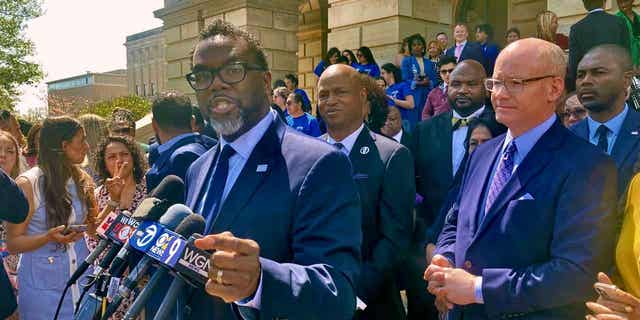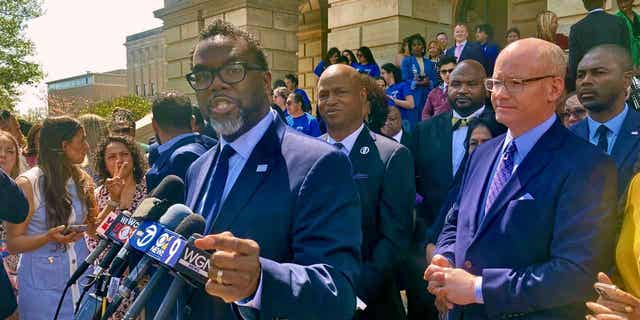
Chicago’s mayor-elect on Wednesday attempted to dispel the often-contentious relationship between the nation’s third-largest city and the rest of the state, telling a joint session of the General Assembly, “There’s more than enough for everybody in the state of Illinois.”
Brandon Johnson, whose victory in the mayor’s race this month provided a welcome boost for progressives, played to his fellow Democrats, who hold supermajorities in both the House and Senate. He extolled the “Blue Wall” they’ve built and pledged to “be a partner in this incredible, progressive body that has delivered for people across the state.”
Pounded later by reporters’ questions about reducing crime in Chicago, he promised to be “smart” as well as “tough,” putting resources into youth employment and other preventive measures as well as enforcement. But his primary message was one of collaboration.
CHICAGO WOMAN CHARGED AFTER DRAGGING BOYFRIEND WITH CAR, FLIPPING VEHICLE IN CRASH: POLICE
“They told us that if something is good for Chicago, that means we’re taking something away from Peoria,” Johnson told lawmakers. “They tell us that the challenges that we face in the city of Chicago … aren’t the same challenges shared by families from Rockford to Carbondale. … No one has to lose at the expense of someone else winning. There’s more than enough for everybody in the state of Illinois.”
Senate Majority Leader Kimberly Lightford, a Democrat from the Chicago suburb of Maywood, said Johnson took a positive step by tabbing team members to keep connected to the Legislature, something that was wanting with current Mayor Lori Lightfoot.

Chicago Mayor-elect Brandon Johnson answers questions outside the Illinois State Capitol in Springfield, Illinois, on April 19, 2023. Johnson, 47, who will be inaugurated May 15, 2023, promised to be “smart” and “tough” while dealing with the city’s crime problem. (AP Photo/John OConnor)
“He wants to work with not only with the Chicago delegation of legislators, but he’s recognizing that … no matter where you are in the state, you have a role to play in the outcomes of the city of Chicago,” Lightford said. She added, “A lot of people lose sight of that. They just say Chicago has issues, not recognizing that it is the economic engine of the state. And you do want to make sure that there’s prosperity there so that it can also extend across the state.”
CHICAGO’S DEPAUL UNIVERSITY ROCKED AFTER CONVICTED SEX OFFENDER ALLEGEDLY ATTACKS TWO WOMEN
Johnson, 47, a two-term Cook County commissioner and former teacher who gained traction with the full-throated support of the powerful Chicago Teachers Union, promised to tackle the city’s financial trouble with the “same smart, responsible, bold approach” that Democratic Gov. J.B. Pritzker and lawmakers have taken in Springfield, reducing the state’s billions of dollars in debt and consequently receiving credit upgrades from Wall Street bonding houses.
But he also pledged investments in neighborhood schools, youth employment and health care — particularly mental health — and combating crime. Such initiatives will need an assist from Springfield, Johnson said. When addressing reporters later, he declined to talk specific figures, labeling that as “dictating” rather than “collaborating” with state partners.
On crime, he said, “Public safety is a prerequisite to the prosperity of Chicago and the voters have sent a clear message that they want to get smart, not just tough on crime.”
After weathering criticism from runoff rival Paul Vallas over previous statements to “defund” the police, a movement that arose after the 2020 murder of George Floyd by Minneapolis police, Johnson said Wednesday that he would add 200 detectives to the force. But he also said he would increase funding to battle “the root causes of violence” and provide mental health care for police officers.
“The smart way is investing in people,” Johnson said.
CLICK HERE TO GET THE FOX NEWS APP
Johnson, who frequently mentions that he and his wife are raising three children in the westside Austin neighborhood, among the city’s most violent, took heat for comments he made following last weekend’s melee in downtown Chicago that left two teenagers wounded by gunfire. He said he didn’t condone the violence but said “it is not constructive to demonize youth who have otherwise been starved of opportunities in their own communities.”
He rebuffed a reporter’s question about whether he sent a mixed message.
“It’s not a mixed message. … This is a false choice. You can make sure that we eradicate the root causes that lead to violence, and we also can make sure that there’s support on the front line to make sure that we’re preventing violence,” Johnson said. “No one takes it more seriously than a family that lives through it every single day.”







